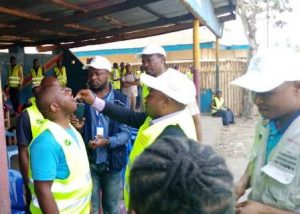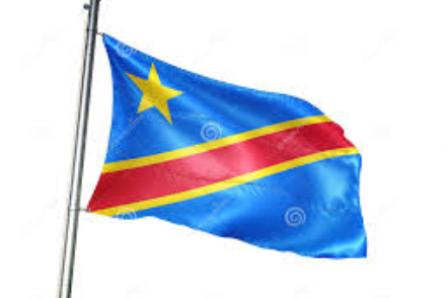
WHO Photo
MBUJI-MAYI / GENEVA — Phase 2 of the biggest ever oral vaccination campaign against cholera is scheduled to take place from 3-8 July 2019 in 15 health districts in the four central provinces of the Democratic Republic of the Congo (DRC) – Kasaï, Kasaï Oriental, Lomami et Sankuru.
The second dose of vaccine confers lasting immunity against cholera, and is being targeted at 1 235 972 people over 1 year of age. The 5-day, door-to-door campaign will involve 2632 vaccinators recruited mainly from local communities, whose job it is to administer the oral cholera vaccine, fill in vaccination cards and tally sheets, and compile a daily summary of the teams’ progress.
In parallel, 583 community mobilizers have been selected – 1 mobilizer for every 3 teams in urban areas and 1 mobilizer for every 2 teams in rural districts. Their job is to alert local people that vaccinators will visit their homes. They will use loudspeakers to spread the message, particularly in the early evening.
The campaign is organized by the Ministry of Health with technical, logistic and financial support from WHO, Gavi, the Vaccine Alliance and the Global Task Force on Cholera Control (GTFCC).
It is the second such campaign in this central region of the DRC. 1, 224, 331 people over 1 year of age were vaccinated during the first round in late December 2018. The purpose of the vaccination campaign is to contain the serious epidemic which resulted in 9154 presumed cases and 458 deaths (case-fatality rate of 5%) in the 5 affected provinces in Kasaï region between January and December 2018.
“This cholera vaccination campaign marks the intensification of our response in the DRC,” said Dr Matshidiso Moeti, WHO Regional Director for Africa, “WHO and our partners are working with national authorities to roll out the vaccine, which comes in addition to multiple interventions introduced since the beginning of the cholera epidemic, including sanitation and water quality control in the affected areas, many of which have little access to a safe water supply.”
Right now, with the second dose, the preventive campaign for which 1 235 972 doses of oral vaccine have been laid in will ensure coverage of all at-risk areas in this central region of the DRC. The vaccines have been provided from global cholera vaccine stocks managed by Gavi, the Vaccine Alliance.
“This vaccination campaign will play a key role in bringing this cholera outbreak under control,” said Dr Seth Berkley, CEO of Gavi.
“The DRC is currently going through an unprecedented combination of deadly epidemics, with Ebola and measles outbreaks also causing untold misery across the country. It is vital that the global effort to control these outbreaks continues to receive support: we cannot allow this needless suffering to continue.”
In 2018 the DRC reported a cumulative total of 29 304 suspected cholera cases and more than 930 deaths (case-fatality rate 3.17%). Since the start of 2019 and up to epidemiological week 23 (3-9 June), at least 12 247 suspected cases of cholera and 279 deaths (case-fatality rate 2.2%) have already been reported in 137 health districts in 20 of the 26 provinces of the DRC. Cholera is a highly contagious communicable disease transmitted via contaminated water or food. It causes severe diarrhoea and dehydration which must be treated immediately to avoid death after only a few hours and to stop the disease from spreading on a massive scale throughout an environment at risk.
“This cholera vaccination campaign in the 4 central provinces of the DRC is crucial to stop the disease from gaining a permanent foothold in the target areas of Kasaï, Lomami and Sankuru. The vaccinators will visit every household, even in the remotest areas, to administer the second dose vital for ensuring long-term protection against cholera,” explains Dr Deo Nshimirimana, Acting WHO Representative in the DRC.
“We must not forget that oral cholera vaccine works in conjunction with other effective prevention measures such as improvement of sanitary conditions, individual and collective hygiene including regular hand-washing (with soap) after going to the bathroom or before meals, and lobbying authorities to improve access to drinking water.”
Source: WHO

